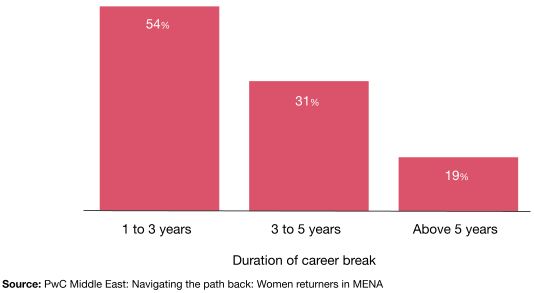Executive summary
Women in MENA have achieved remarkable progress in the last few decades. This progress results from the rapid economic and social transformation in the region, particularly in the GCC countries, where national development strategies and policies have been instrumental in integrating women into the workforce.
Having to balance their professional and personal roles, women often take career breaks over the course of their lives. By leveraging the talent pool of experienced women who are eager to return to work, companies can not only enhance the quality and diversity of skills and perspectives in the workplace, but also effectively address the scarcity of women in senior leadership roles.
Our report highlights the experiences of women and the challenges they faced. It draws on insights collected from focus groups and a survey of around 1,200 women across the UAE, Saudi Arabia, Qatar, Egypt, Bahrain, Jordan, Kuwait, Lebanon, and Oman, as well as interviews with CEOs leading the workforce in the MENA region.
A snapshot of our findings:
Explore the key findings
Of the women who have taken a career break, the top motivator has been caring for a family, raising children or recovering from childbirth.
Top reasons for taking a career break (% of women who have taken career breaks)

43% of women that have taken career breaks have returned to work in MENA. Our survey reveals that 60% of women believe that taking a career break will negatively impact their career, with this figure being even higher for working mothers.
46% of participants indicated the importance of the support of their partner and wider family when returning to work. Additionally, women prioritise employers that provide work-life balance, as well as flexible or remote working arrangements, and 27% of women surveyed say that access to job opportunities that match their skills and experience is another factor enabling them to return to work.
Career breaks are nothing new, and yet women still face obstacles when returning to business.
These returning women contribute around US$385bn of GDP across the nine MENA countries we surveyed. Businesses also benefit from being able to access a skilled and experienced talent pool, thereby building strong and sustainable leadership pipelines.
Some of the challenges that have been highlighted include
- 1. Employer stigma around career breaks
- 2. Lack of flexible working arrangements
- 3. The risk of being “mommy tracked”
1. Employer stigma around career breaks
Employers sometimes assume that returning women lack experience or have diminished skills. As a result, their applications are rejected before even being considered.
Our results indicate that the longer the time spent out of work, the more challenging it is to return.

2. Lack of flexible working arrangements
The scarcity of flexible roles often forces women to choose between part-time roles or risk going into roles that are not commensurate with their skills and experience.
3. The risk of being “mommy tracked”
Women that have returned to work shared their frustrations at being “mommy tracked”, as employers make assumptions about their willingness to take up challenging roles or assignments, or that they are less committed to their jobs due to caregiving responsibilities.
How can businesses in the region unlock this talent effectively?
Conclusion
Retaining the vast pool of talent that women re-entering the workforce bring is crucial for the success of businesses across the region. Actively encouraging women to re-enter the workforce is a strategic imperative that brings together a richer blend of skills, diverse perspectives, and creativity, leading to better business performance and sustainable leadership pipelines.
In the war for talent, failing to harness this talent pool means missing out on vital skills.By taking proactive action, businesses can move the needle from awareness to action and results. Embracing women's roles in the workforce is not just a moral imperative, it is a key catalyst for growth.












